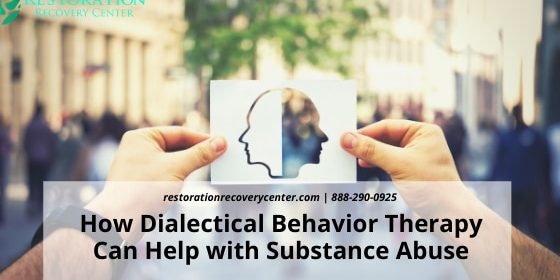How Dialectical Behavior Therapy Can Help with Substance Abuse
What is DBT and how does it help with substance abuse?
Dialectical behavioral therapy (DBT) is a branch of psychotherapy that is rooted in the principles of cognitive-behavioral therapy (CBT) to help with substance abuse. The treatment style was developed originally to aid those with borderline personality disorders (BPD) but has found success treating conditions that are related to or independent from BPD including:
- Substance abuse
- Depressive disorders.
- Bipolar disorder.
- Posttraumatic stress disorder.
- Anxiety disorders.
Methods of Change used in DBT to help with substance abuse
In DBT, the therapist controls all aspects of treatment planning and movement. The therapist will establish and organize the components listed below. Beyond that, the therapist will direct other care including medication management, substance use treatment, case management, and vocational rehabilitation when needed.
How DBT works to help with substance abuse
Dialectical behavior therapy primarily is used for people battling suicidal thoughts and self-injurious behaviors. This form of treatment involves four components: individual psychotherapy, group skills training, phone coaching and ongoing support from a team of therapists. Like mentioned above, DBT is a modified form of cognitive behavioral therapy, a psychotherapy used to help with substance abuse by helping people deal with a range of mental health problems, including depression, suicidal thoughts and substance use disorders. However, DBT differs from CBT in that DBT encourages patients to learn to accept stressing thoughts, feelings and behaviors rather than reject them.
DBT’s use of dialectical abstinence to help with substance abuse
In treatment of addictions, there has long been a divide between those who promote abstinence and those who promote harm reduction. Rather than looking exclusively to either of these options, DBT’s approach is to help with substance abuse and to support “dialectical abstinence.” This means that the therapist helps the person in therapy to do everything possible to achieve abstinence, while also supporting a harm-reduction approach when relapse happens. This dialectical stance allows the person to receive the benefits of both approaches.
Prioritized Treatment, Skills, and Stages for Dialectical Behavioral Therapy to help with substance abuse
Dialectical Behavior Therapy helps identify irrational thoughts and beliefs and teaches a different way of thinking that will help make life more bearable. It also helps the patient identify their strengths and build on them, it will help with substance abuse by encouraging self-confidence and a general better outlook on life. DBT works on acceptance and change. DBT is a collaborative effort between the patients and staff, encouraging relationship problem solving in therapy and assignments, role-playing interactions, and practicing coping skills. Skills are taught in weekly lectures, reviewed in assignments, and referred to in almost every group.
The weekly individual sessions at the California Addiction Treatment Center in Auburn place importance on the problem-solving behavior, any troubles the patient may have or is facing, and improving basic social skills. Patients typically have multiple problems they are facing so therapist first make sure there is no life-threatening behavior, then therapy-interfering behavior such as not working towards the goals, then quality of life behavior such as relationship problems, and then they work on learning the new skills.
Help with substance abuse by reducing destructive behavior and treat addictions
Dialectical behavior therapy (DBT) may seem like a complicated treatment approach at first, but it is based on one simple goal— to help with substance abuse. DBT combines the most effective and evidence-based methodologies of CBT, along with holistic approaches, such as meditation and mindfulness training. The outcome is a unique, modern, and highly individualized therapy that is ideal for the treatment of both addiction and mental illness.
When addiction and mental illness occur at the same time, this is referred to as a co-occurring illness or dual diagnosis. The Substance Abuse and Mental Health Services Administration (SAMHSA) found that over seven million adults struggle with a dual diagnosis, and only a small fraction of them get the help they need. DTB is just one of many therapies used to address these issues.






